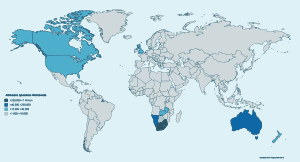Is Flemish a Germanic language? CodyCross is an addictive game developed by Fanatee. What is Deutsche language? Are you looking for never-ending fun in this exciting logic-brain app? Each world has more than groups with puzzles each.
From Now on, you will have all the hints, cheats and needed to complete this puzzle. You will have in this game to find the words from the hint in order to fulfill the board and find a final word of the puzzle group. for WEST GERMANIC LANGUAGE FROM DUTCH VERNACULAR. We have shared all the for this amazing game created by Fanatee.
Welcome to our website for all West Germanic Language From Dutch Vernacular. This game is created by Fanatee for both iOS and Android devices. Netherlands where it is the official language , and about sixty.

Afrikaans evolved from the Dutch vernacular of South Holland spoken by the mainly Dutch settlers in South Africa, where it gradually began to develop distinguishing characteristics in the course of the 18th century. The Afrikaans language is unique to the African linguistic landscape. Dutch is written in the Latin alphabet, though it has one additional character beyond the standard alphabet. Afrikaans can trace its roots back to a West Germanic Language and ultimately evolved from the Dutch vernacular of South Holland. Germanic languagesGermanic languages, subfamily of the Indo-European family of languages, spoken by about 4million people in many parts of the worl but chiefly in Europe and the Western Hemisphere.
As a dialect of Low Saxon, Tweants is an Indo-European language , belonging to the West - Germanic group of Germanic languages. It is a direct descendant from Old Saxon, and as such, it is closely related to English and Frisian. It is the most widely spoken and official or co-official language in Germany, Austria, Switzerlan South Tyrol in Italy, the German -speaking Community of Belgium and Liechtenstein. This is the third most spoken language in South Africa. Dutch belongs to the Low Franconian group of the West Germanic languages.
Afrikaans, amongst many other languages, is derived from Dutch. The word ‘Dutch’ comes from the Old Germanic word ‘Theodisk’ which means ‘of the people’ or ‘vernacular’, as opposed to official, which was Latin and later, French. In modern German, Theodisk became Deutsch and in Dutch, it split into two forms – Duits, which means German and Diets, which is closer to Dutch but no longer in use. In South African contexts, Boers (Afrikaans: Boere) refers to the descendants of the proto Afrikaans speaking settlers of the eastern Cape frontier in Southern Africa during the 18th and much of the 19th century.
Afrikaans is a West Germanic language spoken in South Africa, Namibia an to a lesser extent, Botswana and Zimbabwe. It evolved from the Dutch vernacular of South Holland (Hollandic dialect) spoken by the mainly Dutch settlers of what is now South Africa, where it gradually began to develop distinguishing characteristics in the course of the 18th century. The Dutch language is a natural pick for English and German speakers since it uses many words that are more or less the same. Unlike German , Dutch does not have any case system and complicated grammar rules.
Germanic languages Germanic languages , subfamily of the Indo-European family of languages , spoken by about 4million people in many parts of the worl but chiefly in Europe and the Western Hemisphere. Dutch is the majority language in northern Belgium, being used in written language by three-fifths of the population of Belgium. It is one of the three national languages of Belgium, together with French and German, and is the only official language of the Flemish Region. The various Dutch dialects spoken in Belgium.
They’re both of the same origin. Dutch ’ is a loanword derived from early Germanic languages. It appears to have the same connotation as ‘ vernacular ’ — the language of the people.

For LOTS of great German lessons for students of all levels,.
No comments:
Post a Comment
Note: Only a member of this blog may post a comment.